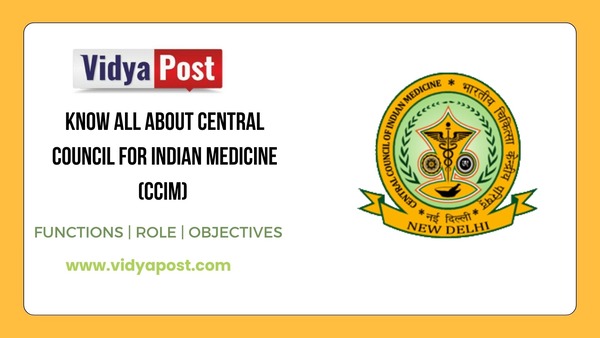Know all about Central Council For Indian Medicine (CCIM) - Functions Role Objectives

The Central Council of Indian Medicine (CCIM) was a statutory organization under the Ministry of AYUSH, Government of India between 1971 and 2021. The CCIM was established in 1971 under the Indian Medicine Central Council Act (Act 48) of 1970. It is one of the Professional Councils under the University Grants Commission (UGC) that oversees higher education in Indian medical systems such as Ayurveda, Siddha, Unani, and Sowa-Rigpa.
It was in the Indian city of New Delhi. The CCIM was established to recommend benchmarks and practices for Indian medicinal systems. Ayurveda, Siddha, and Unani Tibbia education programs at the graduate and postgraduate levels were regulated by CCIM.
Also, Read All about DCI- Dental council of india
HISTORY
The CCIM was established in 1971 under the Indian Medicine Central Council Act (Act 48) of 1970. It is one of the Professional Councils under the University Grants Commission (UGC) that oversees higher education in Indian medical systems such as Ayurveda, Siddha, Unani, and Sowa-Rigpa.
On September 20, 2020, the parliament and president approved the National Commission for Indian Systems of Medicine (NCISM). In addition to maintaining a national and state practitioner registry, the NCISM enacts legislation for the National Eligibility cum Entrance Test (NEET) and the National Exit Test (NET).
Since 2021, the role of the Central Council of Indian Medicine has been taken over by the National Commission for the Indian System of Medicine.
The National Commission for Indian System of Medicine, established by the National Commission for Indian System of Medicine Act of 2021, would govern the Ayurveda and Unani Boards, as well as the Unani, Siddha, and Sowa Rigpa Boards.
ROLE OF CCIM
To build, supervise, develop, and sustain a program dedicated to the upkeep of academic study programs and the practice of the Indian System of Medicine to national and global demands through resource allocation, effective governance, and management.
FUNCTIONS OF CCIM
-
To establish minimal educational levels in Indian systems of medicine, including Ayurveda, Siddha, Unani Tib., and Sowa Rigpa.
-
To make recommendations to the Central Government on topics relating to the recognition (inclusion/exclusion) of medical credentials in/from the Second Schedule to the Indian Medicine Central Council Act, 1970.
-
To keep a Central Register of Indian Medicine and to amend it regularly.
-
To establish Professional Conduct, Etiquette, and an Ethics Code for practitioners to follow.
-
To consider and make recommendations to the Government of India on proposals received from various institutes for the establishment of new colleges of Indian Systems of Medicine, to increase intake capacity in Undergraduate and Postgraduate programs, and to start new or Postgraduate additional subjects. Source
THE MISSION
-
To be an exceptional regulatory organization that guides, develops, and sustains a network of "Institutions of Excellence" in education that meets national demands for global trends while also regulating the practice of the Indian System of Medicine.
-
Improve access to high-quality, low-cost Ayurvedic, Unani, Siddha, and Sowa-Rigpa (AYUSH) medical education.
-
Ensure adequate and high-quality AYUSH medical experts are available in all sections of the country.
-
Support community health principles through promoting equitable and universal healthcare that makes AUS&SR medical professionals' services available to all citizens.
-
Encourage medical practitioners to incorporate the most recent medical research into their practices and to contribute to research.
-
Objectively analyze and rank medical facilities on a regular and transparent basis;
-
Maintain an AYUSH National Medical Register for India.
-
Maintaining high ethical standards in all facets of AYUSH medical services.
-
Have a robust grievance redressal procedure in place. Source
CONCLUSION
The Central Council of Indian Medicine (CCIM) is a governmental organization founded in 1971 under the Indian Medicine Central Council Act. (Ministry of AYUSH, 2018). In addition, the council is in charge of overseeing all research and instructional activities related to Ayurveda, Siddha, Unani Tibb, Sowa Rigpa, Naturopathy, and other ethnic and traditional medicines.
Although they compose the Homeopathic education guidelines, they play no part in the inspection or certification withdrawal. However, the council's principal objective is to be an excellent regulatory organization that advises, develops, and sustains a network. (Central Council of Indian Medicine, 2016).
Also, Read All about INC
Share:

2 Comments
Jordan Singer
2d2 replies
Santiago Roberts
4d